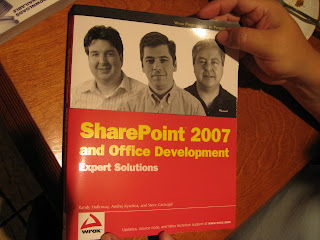 Reading SharePoint 2007 and Office Development, by Randy Holloway, Andrj Kyselica and Steve Caravaja. It's about collaborative software—how an office can share documents, manage work flow, make web portals.
Reading SharePoint 2007 and Office Development, by Randy Holloway, Andrj Kyselica and Steve Caravaja. It's about collaborative software—how an office can share documents, manage work flow, make web portals.Does he ever read anything for fun? Yes. His last fun book was The Da Vinci Code, by Dan Brown.
His favorite books? The English translation would be something like I Dreamt that Snow was Burning, by Antonio Skármeta, a Chilean author who was exiled to Germany. It’s a kind of autobiographical novel, set in 1973. The president of Chile was deposed by a coup d'état and the military tired to wipe out the leftest opposition, which included him.
Another favorite--Captain Pantoja and the Special Service, by the Peruvian writer, Mario Vargas Llosa. It's about a lieutenant in the Peruvian army who, while serving in the Amazonian jungle, and has to put together a female service to make the troops happy and scandal erupts. The book, he says, is hilarious.
And, another favorite book--A Hundred Years of Solitude, by Gabriel Garcia Marquez. What makes it so good is the new style and technique in Latin American literature—Marquez captures a fantastic imaginative, ghostly world of myths and legends that are entwined with reality. Besides having mastery of language, he’s very funny and the plot keeps you in suspense. The book revolves around a town in Northern Columbia called Macando, isolated from the world, and it contains three generations of family and life stories.
If he were to write his own book it would be fiction, probably set here, though before, he would have thought he’d set it in Latin America, where he's originally from….but first, before beginning to write, he would have to immerse himself in life here more in order to write it. He lives an isolated life.
He would write about the Latin American migration and the music and art that has become more popular here because of it, starting in the 1980s.
What he likes about where he lives—he lives on a quiet, tranquil lake, with calming waters, in a rural/suburban town in Massachusetts. He likes the nature and the friendly, nice people and the turkeys that come running through.
About the technology books he reads—technology, he says, is ephemeral. No one reads a full technology book. He also does web research.
Eighty percent of his reading these days is technical. He also reads the New York times and about 2 or 3 books a year. He used to read much more than that, but now he has to keep up with the technology—the flood of info is tremendous. And, in the workplace you can’t specialize in any one thing, you have to learn a lot about many things that are very evolving.
His prediction: the next generation of Latino moms will be reading on the beach on Wednesdays--I’d told him about, to my embarrassment, while I was in Imperial Beach in San Deigo, even though I'd spent an entire day photographing readers, and I was just miles from the Mexican border in a Latino neighborhood, I'd only taken photos of white women. He also remarked that a small percentage of seemingly white moms are really Latina moms. Like the Italians in the 30s, 40s and 50s, the Latino culture will evolve.
In talking about urban planning, which I had a few gripes about--the United States is set up for people to burn oil and not for pedestrians like myself--he told me about Robert Moses, a real estate developer, who designed Jones Beach in Long Island with low arches on the roads so the buses couldn’t come through...his plan to keep out the riffraff.


No comments:
Post a Comment